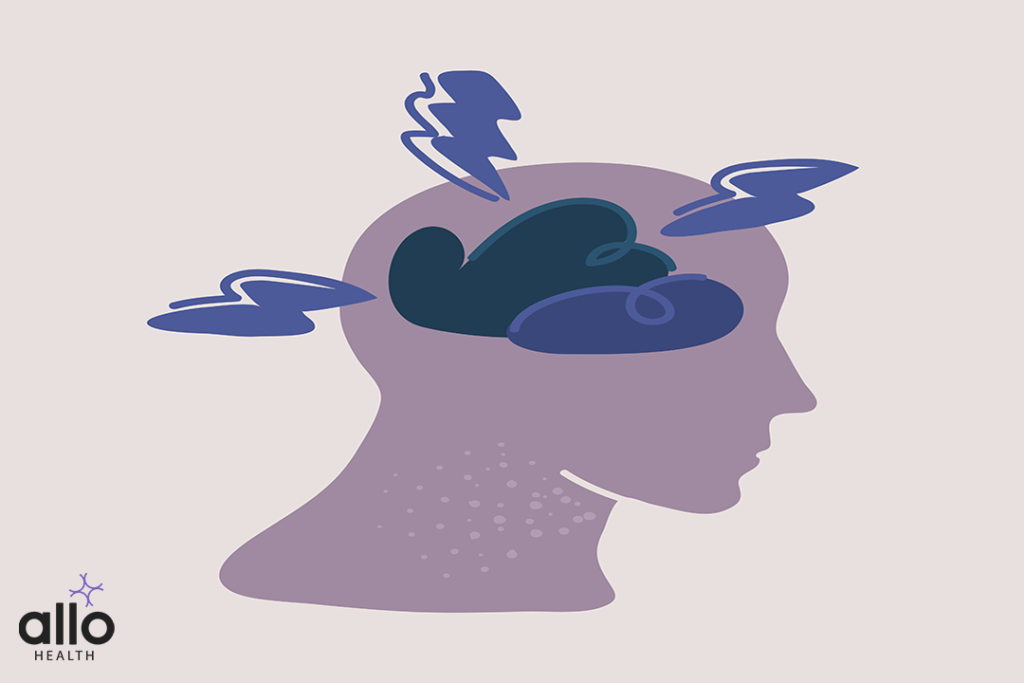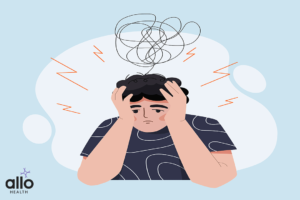Dhat Syndrome: Causes, Symptoms, and Treatment

Allo Health is dedicated to personalized well-being, offering support and trusted information tailored to individual health goals. The platform emphasizes human-generated content, led by a distinguished medical team of experts, including physicians and sexual health specialists. Their commitment to credibility involves rigorous fact-checking, authoritative research, and continuous updates to ensure accurate, up-to-date information. Allo Health's unique approach goes beyond conventional platforms, providing expert-led insights and a continuous commitment to excellence, with user feedback playing a crucial role in shaping the platform's authoritative voice.

Dr. Warisha holds an MBBS degree from GMERS Medical College, Ahmedabad. She has an in depth experience on sexual and reproductive health and rights.
Why This Was Upated?
Our experts continually monitor the health and wellness space, and we update our articles when new information became available.
Updated on 05 September, 2023
- Article was updated as part of our commitment to diversity, equity, and inclusion.

"The following blog article provides general information and insights on various topics. However, it is important to note that the information presented is not intended as professional advice in any specific field or area. The content of this blog is for general educational and informational purposes only.
Book consultation
The content should not be interpreted as endorsement, recommendation, or guarantee of any product, service, or information mentioned. Readers are solely responsible for the decisions and actions they take based on the information provided in this blog. It is essential to exercise individual judgment, critical thinking, and personal responsibility when applying or implementing any information or suggestions discussed in the blog."
Dhat syndrome is a clinical condition that has garnered attention due to its unique cultural and psychological aspects. In this article, we will delve into what Dhat syndrome is, its symptoms, potential causes, myths surrounding it, its impact on health, and available treatment options.
What Is Dhat Syndrome?
Dhat syndrome is a condition characterized by the belief that one is experiencing a significant loss of semen through various means, such as urination, nocturnal emissions (wet dreams), or masturbation. This anxiety about semen loss is deeply rooted in cultural beliefs, particularly in the Indian subcontinent (culture-bound syndrome), where semen is considered a vital part of the body, akin to an elixir.
Key Symptoms of Dhat Syndrome
Individuals with Dhat syndrome may experience a range of symptoms, including:
- Fear of semen loss: Strong belief that one is losing semen (even a single drop of semen) through various means.
- Nocturnal emission: Nighttime ejaculation.
- Semen in urine: Belief in the presence of semen in urine.
- Semen-Loss Anxiety: Heightened feelings of unease and distress because of fear of losing semen.
- Stress: Emotional strain and tension.
- Irritability: Easily provoked or agitated state.
- Fatigue: Persistent tiredness.
- Loss of appetite: Reduced desire to eat.
- Loss of physical strength: Perceived weakness.
- Loss of concentration: Difficulty focusing.
- Psychosexual dysfunction: Challenges in sexual function.
- Discoloration of urine: Concerns about urine color.
- Exhaustion: Overwhelming fatigue.
What Are the Causes of Dhat Syndrome?
Dhat syndrome is primarily driven by cultural beliefs and misconceptions about normal sexual activities. Some potential causes and contributing factors include:
- Excessive Masturbation: Belief in excessive self-pleasure leading to semen loss.
- Sensual Dreams: Misinterpretation of nocturnal emissions.
- Absence of Sexual Desires: Concerns about lack of sexual desire.
- Emotional Imbalance: Anxiety, stress, and related emotions.
- Alcohol Consumption: Belief that alcohol contributes to semen loss.
- Cultural Factors: Unique to certain cultural communities, particularly in the Indian subcontinent caused by lack of knowledge of sexual health.

Facts vs. Myths
| Myth | Fact |
| Semen is an integral part of the body, and its loss is harmful. | Semen loss is natural after sexual intercourse or masturbation. |
| Some believe semen is made up of several drops of blood or bone marrow. | No connection between semen, blood, or bone marrow. |
| Belief that there is loss of semen through urine along iwth other vital substances. | The white discharge in urine is not always semen and contains no vital substances. |
Dhat Syndrome and Health: The Impact on Well-being
Dhat syndrome, characterized by misconceptions surrounding semen loss, can have significant repercussions on an individual’s overall well-being if left unaddressed. Here, we delve deeper into the health-related complications associated with this condition:
- Weakness – Perceived weakness:
Perceived weakness is a common complaint among individuals with Dhat syndrome. They often experience a constant sense of physical debility, which can affect their daily activities and quality of life. This perceived weakness is primarily attributed to the belief that semen loss equates to a loss of vital energy. This mental distress can manifest physically, leading to a constant state of fatigue and lethargy.
- Impotence – Erectile Dysfunction:
Erectile dysfunction (ED) is another distressing issue that can result from Dhat syndrome. Individuals may develop difficulties in achieving and maintaining erections during sexual activity. This is often tied to the anxiety and stress associated with their beliefs about semen loss. The fear of sexual inadequacy can further exacerbate this problem, creating a cycle of anxiety and sexual dysfunction.
- Oligospermia – Low Sperm Count:
Oligospermia refers to a condition where there is an abnormally low sperm count in the ejaculate. While Dhat syndrome is not a physiological cause of oligospermia, the psychological distress it brings can indirectly contribute to this problem. The persistent anxiety and stress associated with semen loss beliefs can negatively impact overall reproductive health, potentially affecting sperm production and quality.
- Infertility – Difficulty in Conceiving:
Infertility can be a devastating consequence of untreated Dhat syndrome. The misconceptions surrounding semen loss can lead individuals to avoid or limit sexual activity, fearing further semen loss. This avoidance can reduce the chances of conception, especially for couples trying to have a child. It is essential to recognize that Dhat syndrome itself does not cause infertility but can be a significant barrier to achieving pregnancy due to these psychological factors.
- Erectile Dysfunction – Challenges in Achieving and Maintaining Erections:
Erectile dysfunction (ED), as mentioned earlier, can be a manifestation of Dhat syndrome. The constant preoccupation with semen loss and sexual performance anxiety can hinder one’s ability to achieve and sustain an erection. This can not only affect sexual satisfaction but also lead to emotional distress and relationship issues.
Diagnosing Dhat Syndrome:
Diagnosing Dhat syndrome can be challenging due to its unique cultural and psychological nature. Healthcare professionals typically follow a comprehensive assessment process that includes the following steps:
Clinical Evaluation:
- Patient History: Healthcare providers begin by taking a detailed patient history, including an exploration of the individual’s symptoms, beliefs, and cultural background. Understanding the cultural context is crucial in diagnosing Dhat syndrome.
- Duration and Severity: Assessing the duration and severity of symptoms is important. It helps determine the impact of Dhat syndrome on the individual’s daily life and well-being.
Rule Out Underlying Medical Conditions:
- Physical Examination: A physical examination may be conducted to rule out any underlying medical conditions that could be contributing to the symptoms. This includes assessing for urological or neurological issues.
- Laboratory Tests: In some cases, laboratory tests may be ordered to check for specific medical conditions or abnormalities that could be related to the symptoms.
Psychological Assessment:
- Psychiatric Evaluation: A mental health professional may conduct a psychiatric evaluation to assess the presence of anxiety, depression, or other psychological conditions that often co-occur with Dhat syndrome.
Cultural Sensitivity:
- Cultural Competence: Healthcare providers must approach the diagnosis with cultural competence, acknowledging the cultural beliefs and perceptions that may be driving the individual’s distress.
Diagnostic Criteria:
- Diagnostic and Statistical Manual of Mental Disorders (DSM): Dhat syndrome is not officially recognized as a distinct disorder in international diagnostic systems like the DSM-5. However, healthcare providers may use its criteria to assess related conditions such as somatic symptom disorders and anxiety disorders.
Collaborative Diagnosis:
- Multidisciplinary Approach: Given the complexity of Dhat syndrome, a collaborative approach involving physicians, psychologists, and cultural experts may be necessary to reach a comprehensive diagnosis.
Differential Diagnosis:
- Ruling Out Other Conditions: It’s essential to differentiate Dhat syndrome from other medical and psychiatric conditions that may present with similar symptoms, such as sexual dysfunction, anxiety disorders, or hypochondriasis.

Treatment Options for Dhat Syndrome
Addressing Dhat syndrome necessitates a comprehensive and empathetic approach, as it involves both psychological and cultural factors.
Empathetic Counseling:
- Listening with Empathy: Empathetic counseling plays a crucial role in helping individuals with Dhat syndrome. Healthcare professionals should listen attentively to patients’ concerns without judgment. This approach fosters trust and allows patients to express their anxieties and misconceptions openly.
- Reassurance: Patients often require reassurance that their symptoms and beliefs are understood and taken seriously. Reassurance helps alleviate their distress and fosters a sense of emotional support.
Multispecialty Collaboration:
Involvement of Specialists: Collaborating with specialists in various fields is essential for a comprehensive approach. Urologists, venereologists, and neurologists may be consulted to rule out any underlying medical conditions and provide expert guidance.
Psychological Support:
Mental Health Specialists: Mental health professionals, such as psychologists and psychiatrists, are instrumental in addressing the psychological aspects of Dhat syndrome. They can help individuals manage anxiety, depression, and other emotional challenges that may accompany the condition and provide other health care assistance that maybe required.
Sex Education:
Clarifying Misconceptions: A vital aspect of treating Dhat syndrome is providing accurate sex education. Healthcare providers should take the time to clarify misconceptions about semen, nocturnal emissions, and their impact on health. This education helps individuals develop a more realistic and informed perspective.
Stress Management:
Yoga and Lifestyle Changes: Stress management techniques, including yoga and lifestyle modifications, can be beneficial. These practices promote relaxation and help individuals cope with the anxiety and stress associated with Dhat syndrome. Encouraging a healthy lifestyle that includes regular exercise and balanced nutrition can also contribute to overall well-being.
Anxiety and Depression:
Treating Underlying Conditions: Many individuals with Dhat syndrome may also experience anxiety and depression. In such cases, medication and therapy may be recommended to address these underlying conditions. Reducing anxiety and depression can, in turn, alleviate the symptoms of Dhat syndrome.
Sexual Dysfunction:
Education and Counseling: Addressing sexual dysfunction related to Dhat syndrome requires education and counseling. Individuals should be provided with information on healthy sexual practices and techniques to overcome performance anxiety. This can help them regain confidence in their sexual abilities.
Dhat Syndrome and Culture:
- Dhat syndrome is deeply intertwined with cultural beliefs and norms, particularly prevalent in certain regions like India.
- Cultural factors play a significant role in shaping individuals’ perceptions of semen and its supposed vital importance.
- In Vedic scriptures and Ayurvedic texts, semen is considered as the most valuable of all bodily fluids.
- In these cultures, semen is often viewed as an integral part of the body, with its loss perceived as a depletion of one’s physical and mental strength.
- These cultural beliefs can lead to feelings of shame, guilt, and anxiety when individuals believe they are experiencing semen loss.
- Understanding the cultural context is essential when addressing Dhat syndrome, as it informs the way individuals perceive and respond to their symptoms.
- Healthcare professionals must approach treatment with sensitivity to these cultural nuances to provide effective support and education to those affected by this condition.
Key Takeaways
- Dhat syndrome is a clinical condition with unique cultural and psychological aspects, particularly prevalent in the Indian subcontinent.
- It is characterized by the belief of experiencing significant semen loss through urination, nocturnal emissions, or masturbation, rooted in cultural beliefs that consider semen as vital to the body.
- Symptoms of Dhat syndrome include fear of semen loss, anxiety, stress, feeling of weakness, irritability, and psychosexual dysfunction.
- The condition is primarily driven by cultural beliefs and misconceptions about normal sexual activities, leading to psychological distress.
- Diagnosing Dhat syndrome involves a comprehensive assessment, including patient history, ruling out underlying medical conditions, psychiatric evaluation, and cultural sensitivity.
- Treatment options encompass empathetic counseling, collaboration with specialists, psychological support, sex education, stress management, addressing anxiety and depression, and education and counseling to address sexual dysfunction. Understanding the cultural context is vital when addressing this condition.
Frequently Asked Questions
Q: Does hypochondriacal symptoms accompany dhat syndrome?
A: Hypochondriacal symptoms can sometimes co-occur with Dhat syndrome, where individuals may excessively worry about perceived health issues related to their semen loss, even when no actual medical problem exists such as impotence and premature ejaculation. These concerns can contribute to the distress associated with Dhat syndrome.
Q: What is Dhat syndrome, and how is it related to frequent intercourse?
A: Dhat syndrome is a cultural-bound syndrome found primarily in South Asian countries. It involves the belief that one is losing vital energy or semen through various means, including frequent sexual intercourse. People with Dhat syndrome often associate their symptoms with excessive sexual activity.
Q: Is Dhat syndrome a lifelong condition?
A: Dhat syndrome is not necessarily a lifelong condition. With appropriate psychotherapy and cultural sensitivity, individuals can experience symptom improvement and better coping strategies.
Q: Can education and awareness help alleviate Dhat syndrome?
A: Psychoeducation and awareness programs can be effective in helping individuals with Dhat syndrome understand the nature of their condition and challenge misconceptions. These programs may involve providing accurate information about semen and its role in the body.
Q: What are the common cultural beliefs associated with Dhat syndrome?
A: Dhat syndrome is often linked to cultural beliefs that semen is a precious bodily fluid containing vital energy. People with Dhat syndrome may believe that the loss of semen, whether through urination, nocturnal emissions, or sexual activity, leads to physical and mental weakness.





































